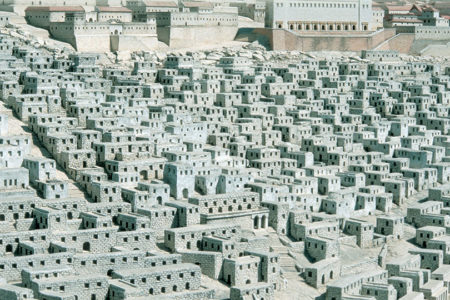The Mosaic Law: A Hard Road to Travel
Around two o’clock in the morning the climb had begun. According to the guide, the traditional Mount Sinai hike would be a 7,497-foot ascent. The plan was to reach the summit in time to see a breathtaking view of the sun rising over the mountains. Many believe this is the place where Moses received the Law from God.
The entire Sinai ridge is hard granite. The mount’s physical features serve as a graphic illustration of the Mosaic Law. According to the apostle Paul, a former Pharisee, the Law was not designed to provide personal salvation. Rather, one of its purposes was to show people their need for salvation (Rom. 3:20). Depending on a person’s attitude, the Law can fall on one hard, like a stone that crushes. It falls hard on the braggart, on the brazen, and on the bold.
When the people of Israel assembled at Mount Sinai, an epic moment was about to occur. God was to make a special covenant with His people, which would serve as their guiding light. It would involve a series of laws. The Jewish people know them as Torah. Commonly, Torah refers to the first five books of the Old Testament. However, Torah also refers specifically to the commands or instructions recorded in Exodus and Leviticus. In Scripture the commands are the revelation of God to Moses, who wrote the words and gave them to Israel at Sinai (Ex. 34:27). It was incumbent on Israel to obey and follow the laws without fail. Only then would the blessings associated with the covenant be realized (Ex. 19:5).
The Torah, or Mosaic Law, was a conditional covenant between God and the nation of Israel. This meant that the contract made at Mount Sinai was based on the faithfulness of God and Israel. Some claim the Mosaic Law was actually formed from other ancient laws of the time. The classic example is the Code of Hammurabi (1728–1686 B.C). Though there are some close parallels, there is also a significant difference. According to Professor R. K. Harrison, “The Code of Hammurabi is clearly deficient in spiritual thought, and in general it placed a lesser value upon human life than did the Mosaic legislation.”1
Basically, the Mosaic Law consists of three categories: moral, civil, and ceremonial. The moral laws pertain to an inward, heartfelt observance for holy living. These include the Ten Commandments, sometimes viewed as God’s “Ten Words” (Ex. 20:1–17). The civil laws govern Israel’s social life (Ex. 21:1—23:33). The ceremonial laws relate to Israel’s worship. These would include the Tabernacle, priesthood, and festivals, with all their colorful pageantry (Ex. 25:1—31:18).
God gave the Law to separate Israel from other nations. It was God who created these people as a distinct nation (Isa. 43:15) and called them to be His witnesses (Isa. 43:10). Israel was to be His distinct, holy nation, a kingdom of priests separated unto Him (Ex. 19:6; Dt. 7:6).
The word holy is associated with the concept of sanctification. Therefore, by observing the Law, Israel was to reflect the holiness of its God (Lev. 11:44–45).
The Law also was designed to reveal God’s character to all of mankind. Besides being holy, God is just in all areas, including those involving capital offenses, personal property, and social responsibility. Though the Law was good and perfect (Ps. 19:7), it was a covenant of works. Violations could be atoned for through the sacrificial system outlined in Leviticus 1—7. Still, this feature was only a temporal arrangement, making the Mosaic Law a hard road to follow consistently.
Yet failure to obey the Law resulted in God’s curse (Dt. 27:26).
Hard for the Braggart
A story is told about a rabbi who lived long ago. Just before his death he extended both arms with fingers spread open toward heaven. “Not one have I broken,” he said. His assessment, however, must have differed from God’s.
The Law was given to shut the mouths of all who think they can keep the whole law:
Now we know that whatever things the law saith, it saith to them who are under the law, that every mouth may be stopped, and all the world may become guilty before God (Rom. 3:19).
The world contains many religions and philosophies. They all present some standard for righteousness and salvation. The result is that people can boast within their religiosity, as though telling God to be impressed with their accomplishments and righteous attainment.
However, the Mosaic Law was given to close up, or block up, all this pretentious, pious talk. The whole world is to stand speechless in guilt when confronted with God’s holy and unattainable standard. It is the nature of God’s Law to arouse a feeling of personal guilt. The Law stabs the guilty conscious with an uncanny expectation of impending judgment. The cry from human lips should be for mercy, not self-praise. The Torah’s purpose was to muzzle all haughty talk. The world stands condemned. The Law is a hard road for the braggart (Rom. 3:23).
Hard for the Brazen
Therefore, by the deeds of the law there shall no flesh be justified in his sight; for by the law is the knowledge of sin (Rom. 3:20).
Volumes of personal, subjective speculation abound as to what constitutes sin. Some theological groups view sin as a mere human weakness— a “frailty” easily fixed with time, money, or human exertion.
The purpose of the Law was to quash all such futile, mental absurdity. With the revelation of the Law, the world received clear and exact knowledge of sin. Even the apostle Paul came to know this fact experientially: “I had not known sin but by the law; for I had not known coveting, except the law had said, Thou shalt not covet” (Rom. 7:7).
A true mirror is designed to reveal a true image. The mirror does not lie. Yet, though it may state a cruel truth, it has no power to change the image it reflects; it only tells it like it is.
So, too, is the Law. It provides the knowledge of the horrid sinfulness of sin. It reveals mankind’s transgressions. But it does not correct or give life to a dead spirit. For that, something other than the “mirror” is required.
Jesus Christ is that “something.” Jesus alone can give life. He alone kept the just, harsh demands of the Law (Jn. 8:46). He then imputes its benefits to whoever believes on Him (Phil. 3:9). The fact is, the Law reveals sin; but Jesus saves us from sin.
Sin is a treacherous adversary. Many people justify their behavior and deceive themselves into thinking God doesn’t care what they do. But God does care; and He says, “Take heed, . . . lest any of you be hardened through the deceitfulness of sin” (Heb. 3:12–13). The Law is a hard road for the brazen who are deceived about their sin.
Hard for the Bold
A familiar sales adage says, “The customer is always right.” When a certain store clerk became a police officer, he was asked what he liked about his new vocation. He said the hours and pay were good, but what he really liked best was that the customer was always wrong!2
God’s creation is never right before Him. The tendency is to go astray (Isa. 53:6). “Wherefore, the law was our schoolmaster to bring us unto Christ, that we might be justified by faith” (Gal. 3:24).
A schoolmaster, according to the ancient concept, was a slave entrusted with the moral supervision of a child. Another picture of a schoolmaster was that of a jailer of sorts, who kept the child morally under lock and key. The Law was to function as a guardian over the wayward spiritual inclinations of Israel and mankind. The inclination of the human soul is to challenge the Law. The schoolmaster’s job is to keep everyone in check.
Like a fierce jailer who never sleeps, the Law holds the world in custody so that no one should escape condemnation. The Law, like a good schoolmaster, was to guide the world to the Lord for salvation (cf. Rom. 10:4): “The scripture hath concluded all under sin, that the promise by faith of Jesus Christ might be given to them that believe” (Gal. 3:22).
The Mosaic Law is a hard road for the bold, who think they can flout it.
During the Civil War, the Federal generals and politicians were overly optimistic about taking the Confederate capital at Richmond, Virginia. They nonsensically underestimated the tenacity of their opponents to defend their capital. Each assault on Richmond was thwarted.
The cost to Union soldiers was appalling. Thereafter, whenever a new general took command and proposed another “onto Richmond campaign,” the soldiers lamented with a song. It was a popular tune reflecting past failed attempts, titled “Richmond Is a Hard Road to Travel.”
Likewise, the Mosaic Law is a hard road to travel for salvation. It can only result in personal failure. One may brag of great spiritual achievements; but when measured against God’s revelation from Mount Sinai, those achievements crumble into speechless guilt.
Self-confidence and self-esteem may be commendable, but they are condemnable compared to the perfect Law of God. Like the granite ridge of traditional Mount Sinai or like Richmond during the Civil War, the Mosaic Law is a hard road to travel— for all of mankind.
The Mosaic Law was given at a particular time and for a particular purpose. It has served its objective flawlessly. However, according to Scripture, a New Covenant made by God with Israel (Jer. 31:31–34) supersedes the Old Covenant. The good news is that Jesus established that New Covenant on the cross (Heb. 8:6). The Torah could never give eternal life; but faith in Jesus Christ, who kept the Law, can now give life eternal freely to whosoever will (Rom. 6:23).
ENDNOTES
- R. K. Harrison, Old Testament Times (Grand Rapids: Eerdmans, 1970), 60.
- Paul Lee Tan, ed., “2886: Here Customer Always Wrong,” Encyclopedia of 7,700 Illustrations (Rockville, Md.: Assurance Publishers, 1979), 691.






